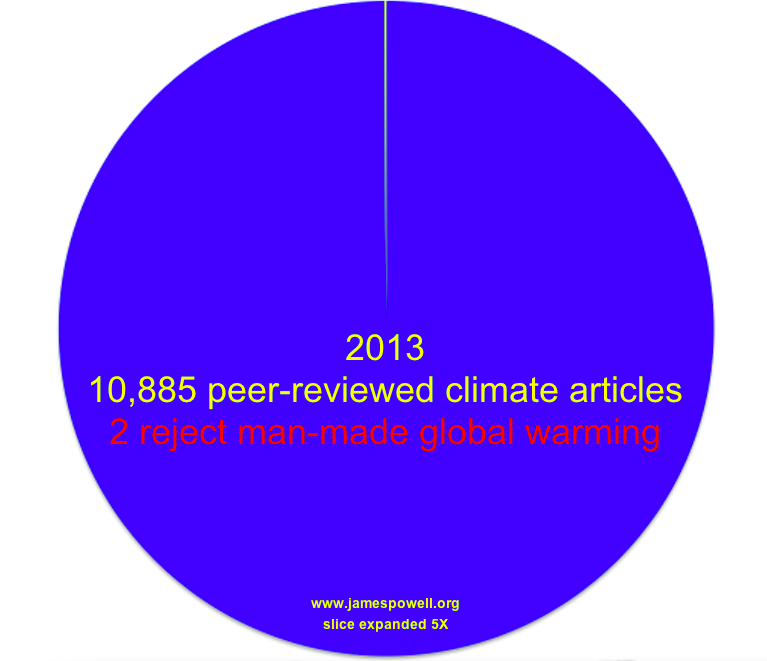The Scientific Consensus on Climate Change
Of all relevant studies from 2013 only two reject anthropogenic climate change.
The scientific consensus on climate change is most notable summarized in the IPCC report and supported by all relevant entities. Of all relevant studies from 2013 only two reject anthropogenic climate change.
IPCC 2013
IPCC AR5 WG1 Summary for Policymakers: Warming of the climate system is unequivocal and extremely likely (95-100%) that human influence has been the dominant cause of the observed warming since the mid-20th century.
Human influence has been detected in warming of the atmosphere and the ocean, in changes in the global water cycle, in reductions in snow and ice, in global mean sea level rise, and in changes in some climate extremes.
This evidence for human influence has grown since AR4. It is extremely likely (95-100%) that human influence has been the dominant cause of the observed warming since the mid-20th century.
In 2005 national science academies of all the major industrialized countries (G8) recognized the IPCC findings.[3]
Since 2007, no scientific body of national or international standing maintains a formal opinion dissenting from the summary conclusions of the IPCC.[4a][4b]
IPCC 2007
The Intergovernmental Panel on Climate Change (IPCC), summarized the consensus in the Fourth IPCC Report (AR4):
Warming of the climate system is unequivocal, as evidenced by increases in global average air and ocean temperatures, the widespread melting of snow and ice, and rising global average sea level.[5]
Most of the global warming since the mid-20th century is very likely due to human activities.[6]
Benefits and costs of climate change for [human] society will vary widely by location and scale. Some of the effects in temperate and polar regions will be positive and others elsewhere will be negative. Overall, net effects are more likely to be strongly negative with larger or more rapid warming.[7]
The range of published evidence indicates that the net damage costs of climate change are likely to be significant and to increase over time.[8]
The resilience of many ecosystems is likely to be exceeded this century by an unprecedented combination of climate change, associated disturbances (e.g. flooding, drought, wildfire, insects, ocean acidification) and other global change drivers (e.g. land-use change, pollution, fragmentation of natural systems, over-exploitation of resources).
The Earth’s climate system is unequivocally warming, and it is extremely likely (at least 95% probability) that humans are causing most of it through activities that increase concentrations of greenhouse gases in the atmosphere, such as deforestation and burning fossil fuels. In addition, it is likely that some potential further greenhouse gas warming has been offset by increased aerosols.[1][2][3]
The scientific consensus is expressed in synthesis reports, by scientific bodies of national or international standing, and by surveys of opinion among climate scientists.
Individual scientists, universities, and laboratories contribute to the overall scientific opinion via their peer-reviewed publications, and the areas of collective agreement and relative certainty are summarised in these high level reports and surveys.
Recent surveys of the literature
The study Quantifying the consensus on anthropogenic global warming in the scientific literature reviewed 11,944 abstracts of scientific papers, finding 4,014 which discussed the cause of recent global warming and reporting:
Among abstracts expressing a position on AGW, 97.1% endorsed the consensus position that humans are causing global warming.
Geochemist James Lawrence Powell analyzed 10,855 relevant science studies from 2013 and found that only two reject anthropogenic climate change. (Paper 1 | Paper 2) (Methodology)
Related
- IPCC: Climate Change 2013 – The Physical Science Basis
- IPCC: Climate Change 2014 – Impacts, Adaptation, and Vulnerability
- Scientific opinion on climate change
- The consensus project
